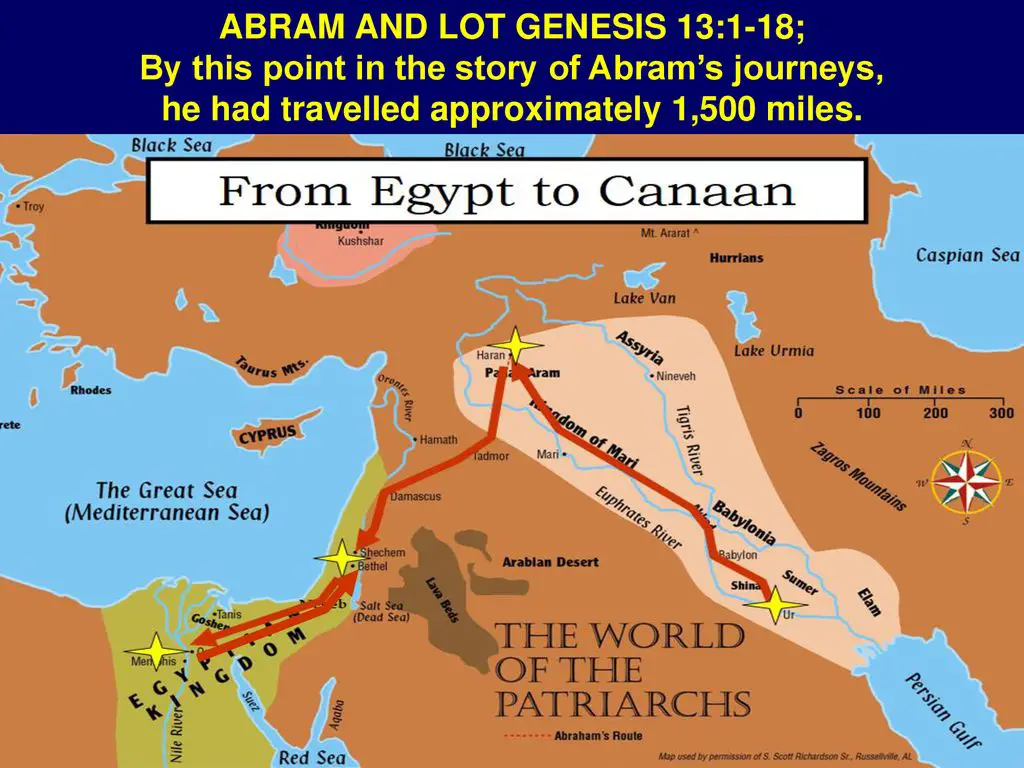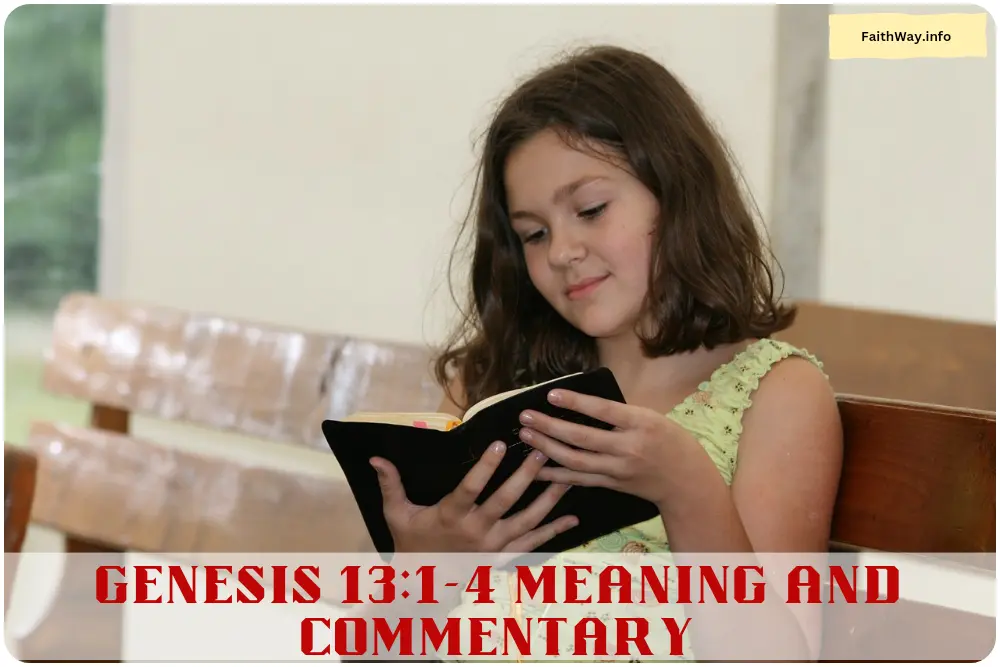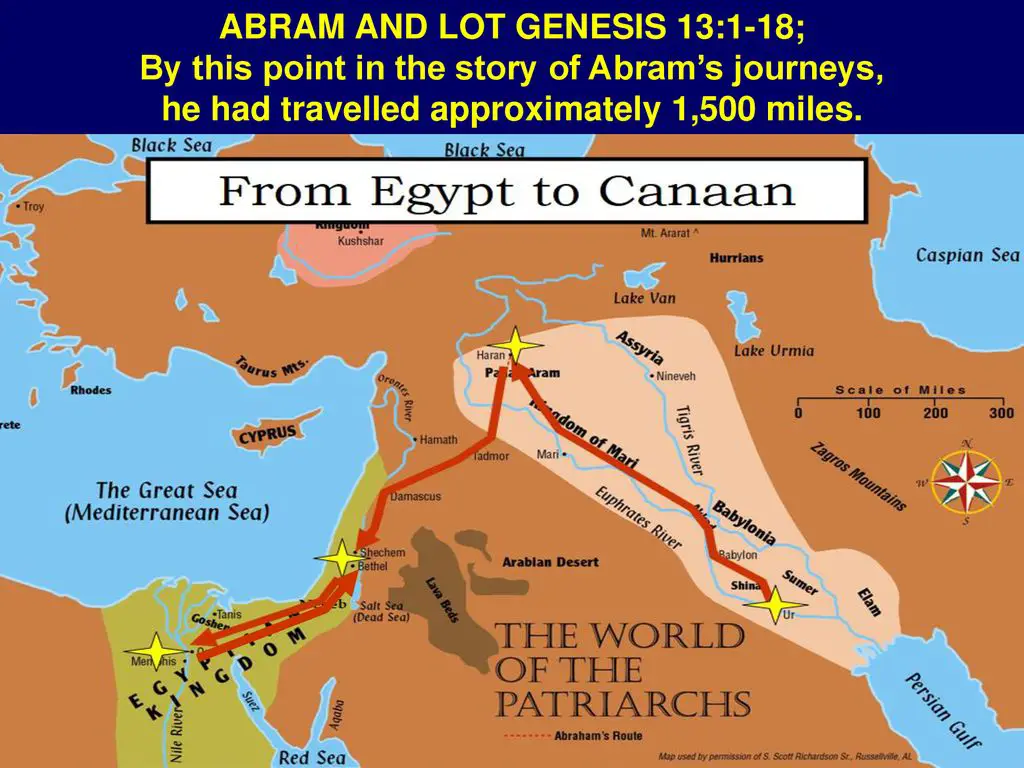The book of Genesis is the first book of the Bible, and it is considered to be the foundation of the Christian faith.
Genesis 13:1-4 is a significant passage in this book as it presents a crucial moment in the life of Abram, who later becomes known as Abraham.
This passage talks about how Abram and his nephew Lot were blessed by God and how they chose to part ways due to their increasing wealth.
In this article, we will take a closer look at the meaning and commentary of Genesis 13:1-4, and how it relates to the overall story of Abraham.
Genesis 13:1-4

“So Abram went up from Egypt to the Negev, with his wife and everything he had, and Lot went with him. 2 Abram had become very wealthy in livestock and in silver and gold. 3 From the Negev he went from place to place until he came to Bethel, to the place between Bethel and Ai where his tent had been earlier 4 and where he had first built an altar. There Abram called on the name of the Lord.”
Genesis 13:1-4 Meaning

In Genesis 13:1-4, the passage describes the journey of Abram (later known as Abraham) from Egypt back to the land of Canaan. The verses read:
“So Abram went up from Egypt to the Negev, with his wife and everything he had, and Lot went with him. Abram had become very wealthy in livestock and silver and gold. From the Negev, he went from place to place until he came to Bethel, to the place between Bethel and Ai where his tent had been earlier and where he had first built an altar. There Abram called on the name of the Lord.”
This passage holds several layers of meaning and significance. Firstly, it marks a pivotal moment in the life of Abram. After a period of sojourning in Egypt due to a famine in the land of Canaan, Abram returns with his wife Sarai and his nephew Lot. This return signifies a restoration of his faith and calling, as well as a reconnection with the land promised to him by God.
The mention of Abram’s wealth in livestock, silver, and gold is noteworthy. It indicates that despite the challenges faced in Egypt, Abram emerged from the experience materially prosperous. However, the true wealth emphasized in this passage is not just material but spiritual. The return to the land of Canaan symbolizes a return to the spiritual richness and promise of God’s covenant with Abram.
The journey from the Negev to Bethel reflects a physical and spiritual movement. The act of moving from place to place suggests a sense of restlessness or seeking, which can be seen as reflective of Abram’s spiritual journey and his quest for fulfillment of God’s promises.
The mention of Bethel and Ai is significant because it recalls Abram’s previous encounters with God at these locations. Bethel was where Abram had built an altar and called upon the name of the Lord earlier in his journey. This return to the place of spiritual significance signifies a recommitment to his faith and relationship with God.
Overall, Genesis 13:1-4 portrays a narrative of return, renewal, and reconnection. It illustrates Abram’s physical and spiritual journey, emphasizing the themes of faith, prosperity, and the fulfillment of God’s promises. The passage serves as a reminder of the importance of staying true to one’s faith and the rewards that come with obedience and trust in God’s plan.
Outlines:

I. Introduction to Genesis 13:1-4
A. Historical Context
B. Summary of Genesis 13:1-4
The passage of Genesis 13:1-4 takes place after Abram’s journey from Egypt and before the destruction of Sodom and Gomorrah. At this point, Abram has already been promised by God that he will become a great nation and that all nations will be blessed through him (Genesis 12:2-3). In Genesis 13, we see this promise beginning to unfold as Abram becomes very wealthy in livestock, silver, and gold.
Abram and his nephew Lot have been traveling together, along with their families and belongings, but their possessions have become too great for the land to support them both. This leads to conflict between their herdsmen, so Abram proposes that they separate and choose new land to settle in. Lot chooses the well-watered Jordan Valley, while Abram stays in the land of Canaan. This passage serves as a turning point in the lives of both men, setting them on different paths that ultimately lead to different outcomes.
II. The Blessings of Abram

A. Material Blessings
B. Spiritual Blessings
One of the main themes in Genesis 13:1-4 is the blessings that God bestows upon Abram. We see these blessings manifested in two ways: material and spiritual. Materially, Abram’s wealth has increased significantly since he left Egypt. This is a fulfillment of God’s promise to make him a great nation. In those times, one’s wealth was measured by the amount of livestock and precious metals they owned, and Abram had an abundance of both.
However, it is essential to note that the material blessings were not the only blessings that Abram received. Spiritually, Abram was blessed with a close relationship with God. God had chosen him and promised to bless him and make his name great. In return, Abram remained faithful and obedient to God, which is seen in his actions and decision-making throughout his journey.
III. The Separation of Abram and Lot

A. The Conflict between the Herdsmen
B. Abram’s Decision to Part Ways
When we examine the events leading up to the separation of Abram and Lot, we see that there was tension between their herdsmen. It is understandable as both men had accumulated a vast amount of wealth, and conflicts often arise when resources are scarce. However, instead of allowing this conflict to escalate, Abram takes the initiative to resolve it peacefully. This shows his wisdom and leadership skills and is a commendable quality that God later uses for His purposes.
Abram’s decision to part ways with Lot also demonstrates his trust in God. He could have easily demanded the better land for himself since he was the elder and leader of the group. But instead, he lets Lot choose first, knowing that God will provide for him wherever he goes. This act of selflessness and submission to God’s will is an example for us to follow in our own lives.
IV. Lessons from Abram’s Journey
A. Trusting in God’s Promises
B. Putting Others Before Ourselves
The story of Abram is one of faith, obedience, and trust in God’s promises. He left everything he knew to follow God’s command, and God rewarded him with great blessings. However, it was not just the material blessings that made Abram stand out; it was his unwavering faith in God’s promises.
As we journey through life, there will be moments where we have to make difficult decisions and trust in God’s promises. We can learn from Abram’s example and trust that God will provide for us, even if it means sacrificing something we value. We must also remember to put others before ourselves, just as Abram did when he let Lot choose the land he wanted first.
Conclusion
Genesis 13:1-4 is a significant passage in the book of Genesis that showcases the blessings of Abraham and the beginning of his separation from his nephew Lot. It also teaches us valuable lessons about trusting in God’s promises and putting others before ourselves. As we continue to study the story of Abraham, we see how his actions and decisions shape his future and ultimately fulfill God’s promises. May we all strive to have the faith and obedience of Abraham and trust in God’s plans for our lives.

Faithway.info, your online sanctuary for deepening your spiritual journey and mastering the teachings of the Bible. At Faithway.info, we are passionate about making the wisdom of the Bible accessible to everyone, fostering a community dedicated to growth, understanding, and support.
